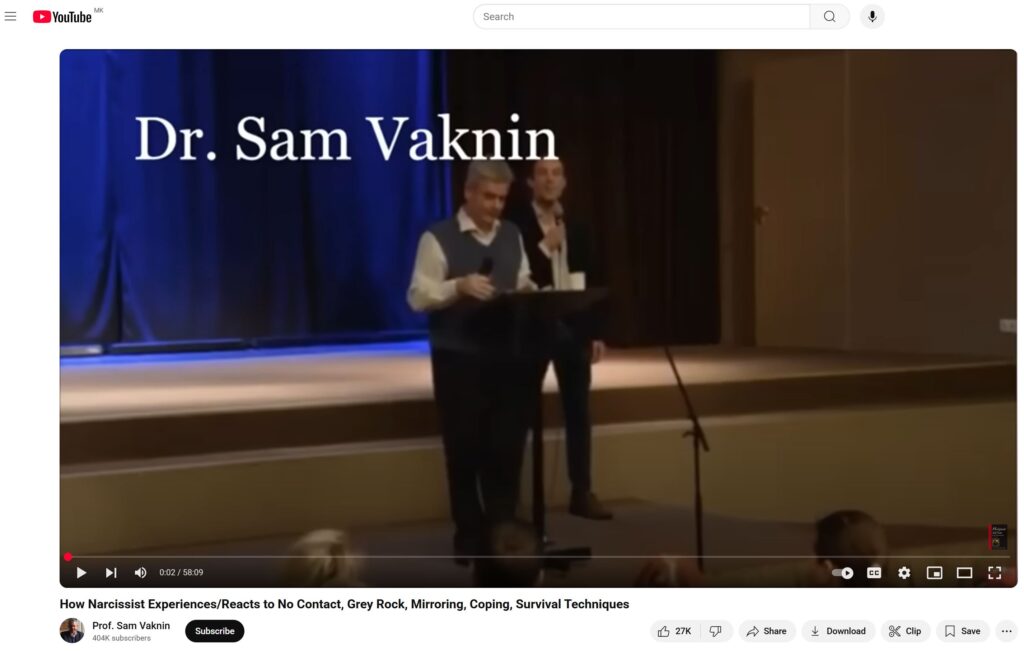Drama Queens/Kings: Narcissists, Borderlines
Dramatic behavior is common in cluster B personality disorders, such as narcissistic, borderline, and antisocial personality disorders. Drama serves various psychological functions, including enhancing functionality, distancing oneself from trauma, regulating self-esteem, and manipulating others. It can also be a diversionary tactic or a form of emotional blackmail. While attention-seeking is often associated with dramatic behavior, it is not the primary motivation for most individuals with cluster B personality disorders.
Social Media Turn Sinister: We, Orphaned Adolescents, Should Rebel
Professor Sam Vaknin criticizes YouTube, Facebook, Instagram, and Twitter for their censorship and manipulation of content, claiming they are fostering confirmation bias and undermining free speech. He argues that these platforms are monopolies that should be regulated and broken up. Vaknin also accuses social media platforms of infantilizing users and promoting narcissism, while suppressing dissenting voices. He warns that the suppression of free speech could lead to violence and calls for peaceful resistance against social media platforms.
Narcissism’s Loose Ends
Professor Sam Vaknin discusses various topics in different sections. In the first section, he talks about the technicality of glass being an amorphous solid, which is actually a liquid. In the second section, he discusses gold diggers and their relationship with narcissists, arguing that faking is a form of virtue signaling and that narcissists do not have an ego. In the third section, he talks about the rise and fall of narcissism in American society and emotional reasoning. In the fourth section, he discusses why some narcissists are successful while others are not, destructive narcissism, and the fallacy of assuming a universal human nature. Finally, he warns about the pursuit of meaning, addiction to hope, and aversion to risk leading to extinction as a species.
Contemptuous Narcissist, Contemptible You, Psychopath Celebrates
Professor Sam Vaknin discusses the triggers of contempt in narcissists, including weakness and perceived inferiority. He explains that the need to feel superior is hardwired in narcissists, and they will hunt for mistakes and contradictions to bring others down to their level. Vaknin also reads two excerpts from literature that he uses as allegories for narcissism, encouraging listeners to replace “color blind” with “narcissist” and discussing an art installation that creates a disorienting cosmos in which mirrors and LED lights combine to create a multitude that repeats itself to infinity.
Abuser In Your Mind Self Stalking
Professor Sam Vaknin discusses the concept of self-stalking and the issue of idea-rism, where his work has been plagiarized and idea-rised by others. He also talks about the importance of fathers in the development of children and the aftermath of narcissistic abuse, where victims may internalize abusive voices. In another section, he discusses the difficulty of dealing with the voices in the head of victims of narcissistic abuse and how introjects affect different parts of the victim’s personality. Finally, he talks about the concept of introjection, which is a defense mechanism against neglect, abuse, trauma, and abandonment, mainly in early childhood.
How Narcissist Experiences/Reacts to No Contact, Grey Rock, Mirroring, Coping, Survival Techniques

Narcissists are victims of post-traumatic conditions caused by their parents, leading to ontological insecurity, dissociation, and confabulation. They have no core identity and construct their sense of self by reflecting themselves from other people. Narcissists have empathy, but it is cold empathy, which is goal-oriented and used to find vulnerabilities to obtain goals. Narcissism becomes a religion when a child is abused by their parents, particularly their mother, and not allowed to develop their own boundaries. The false self demands human sacrifice, and the narcissist must sacrifice others to the false self to gratify and satisfy it.
8 Ways to Survive the Narcissist (ENGLISH Excerpts)
The lecture is divided into two parts, with the first 15 minutes outlining the eight proven ways to manipulate a narcissist, with the most effective being no contact. The other seven techniques include gray rock, deflection, mirroring, shared psychosis, high-grade narcissistic supply, withholding, and intermittent reinforcement. However, the speaker warns that these techniques can lead to the development of narcissistic and psychopathic behaviors in the victim. The lecture concludes with an invitation to explore the narcissist’s mind.
UNEDITED Why We Prefer Narcissism or Psychosis to Mental Health? (RAW WA Real Convo)
Professor Sam Vaknin discusses various topics related to psychology, including the trauma of selfhood, the role of the mother in shaping the self, the importance of narratives, and the concept of collective unconscious and archetypes. He argues that humanity has chosen narcissistic narratives, which have their roots in the enlightenment, and that narcissism is becoming a religion that deifies individuals. Vaknin warns that this trend towards narcissism and psychosis poses a risk to the survival of the species.
Magical Thinking in Personality Disorders and Conspiracy Theorists
Today’s topic is malignant magical thinking. Magical thinking is a healthy stage of development in early childhood, but in adulthood, it can indicate underlying pathology. It involves the belief that thoughts can affect reality, and can lead to delusional disorder. Magical thinking is common in mental health disorders and is exploited by scammers. It is associated with narcissism, borderline personality disorder, psychopathy, and conspiracy theories. It is also linked to ignorance and conspiracism. This refusal to grow up and embrace reality can have destructive consequences for society and the individual.
Is It OK to Cheat on My Narcissist?
In summary, Professor Sam Vaknin discusses three types of cheating in relationships with narcissists: cheating to preserve the shared fantasy, cheating to exit the shared fantasy, and cheating to mortify the narcissist. Cheating to preserve the shared fantasy does not provoke romantic jealousy in the narcissist, as long as it is done discreetly and respectfully. Cheating to exit the shared fantasy provokes extreme romantic jealousy, as it challenges the idealized version of the partner and threatens the shared fantasy. Cheating to mortify the narcissist forces them to confront their true selves and destroys their grandiosity, ultimately leading to the end of the relationship.